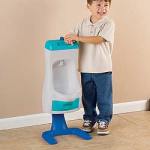You dropped a glass. It shattered as it hit the ground, sending glass splinters skating across the floor and a pool of shard filled juice creeping under the fridge.
“F**k.”
A fairly common response. Except you didn’t say it. Your 18 month old toddler watching you from the doorway did.
My baby has a potty mouth before she’s even potty trained!
She’s so cute at this age. Now she understands around 200 words and can probably say about 60. You can share jokes together, she is beginning to follow your simple rules and instructions, and is able to tell you what she wants to eat and how she likes to play. I bet you love to show off to others how she can repeat a word for you – “Can you say, ‘shark’ ?? … Tell Grandma what this is! …”
What an excellent mimic! And isn’t is she adorable when she tries to use the broom or the phone or the remote just like you do? And now she’s swearing, just like you do. It’s enough to make you want to say, “F**k!” 🙂

How did this happen?!
Your toddler thinks you are the bees knees. You are the bestest, smartest, most wonderfullest person and he wants nothing more than to be like you and to have your approval.
If he’s heard you repeat a word or a phrase often enough, and to be honest it doesn’t have to be that often, he’ll want to try and say it too – to be like you. And if you react when he says it with amusement or attention, even negative attention, he’ll want to keep eliciting that response from you.
As far as your toddler is concerned, he’s ticking all the boxes every time he says ‘the F word’. He does it just like you do, and he gets plenty of attention for it as well.
What should I do to clean up his act?
Remove both the reasons he’s doing it in the first place. Don’t give him something to mimic and don’t give him attention for saying the word.
Believe me, I love a good curse word, when used in the company of adults who appreciate it! But those blissful days of babyhood when you could talk about whatever you wanted, using whatever language you liked and know your child had no clue what was going on are O-V-E-R. And if you can’t spell you’re in trouble, too, because you’re going to spell rather say say things like, ‘ice cream’, or ‘park’, or ‘bedtime’, for many years to come.
Be more mindful of what words you say, and the content of your conversations, from now on. Encourage your child to say a phrase like, “Oh Oh!” when there’s an accident and be sure to do the same yourself.
If he keeps using unwanted words, tell him not to say it, but don’t make a fuss. Do not laugh, no matter how inappropriately hilarious it is to hear your munchkin unknowingly swearing like the proverbial sailor. Keep a blank expression on your face, not one of disapproval either. After briefly telling him not to say the word, go about your business, preferable something unrelated to your child. Now he is no longer getting any worthwhile response from saying this word.
Soon enough he will forget about it and choose to use language that he mimics from your own and that is reinforced by your interactions with him. That is, until he goes to school and learns them all over again from the other kids!
~~~~~~~~~~~~~~
When has your child said something inappropriate?
- Yes, I’m a Mom and Yes, I Swear Sometimes — Big Fucking Deal, Right? (jezebel.com)
- Cussing With Kids (4mothers1blog.com)
- Holy Sh*t: A Brief History of Swearing by Melissa Mohr – review (guardian.co.uk)









